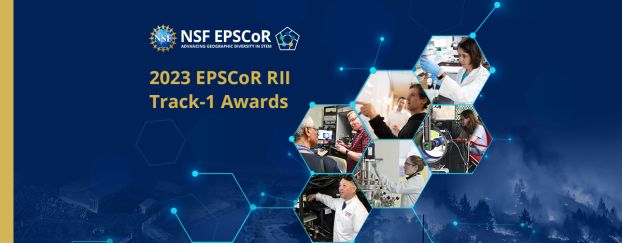Featured Webinars
TIP Impact for EPSCoR
This presentation provides an overview of TIP programs.
INTERN
Program overview of INTERN
IUCRC Program
Presentation on IUCRC Program

Credit: NSF
NSF announces 11 EPSCoR Track-2 awards to bolster innovative and adaptive research infrastructure for climate change research
The U.S. National Science Foundation has invested $56 million in 11 projects, spanning a total of 21 institutions in 19 jurisdictions, through NSF's Established Program to Stimulate Competitive Research (EPSCoR). This investment is a component of NSF's ongoing effort to build research and development capacity and education in states that demonstrate a commitment to research but have not received the levels of investment seen in other parts of the country.
"As evident from EPSCoR’s impact, investing in research infrastructure is a powerful catalyst for strengthening our nation's security, competitiveness, and fostering groundbreaking scientific advancements," said NSF Director Sethuraman Panchanathan. "I'm thrilled to announce this year's EPSCoR Track-2 awards, which will strengthen community and regional efforts to understand the impacts of a changing climate and enhance the resilience of disproportionately affected communities. By addressing these critical challenges, and engaging with communities impacted by climate change, we have the potential to advance innovation and promote economic stability and recovery in EPSCoR jurisdictions and beyond."
This year's projects focus on building collaborative teams of investigators in scientific focus areas consistent with NSF and national priorities. The five-year Research Infrastructure Improvement Track-2 awardees will undertake ambitious interdisciplinary research with a primary focus on enhancing climate change research and resilience capacity to create more opportunities for communities facing disproportionate impacts.
The awardees and summary of each project are listed below:
-
Supporting rural livelihoods in the water-stressed Central High Plains: Microbial innovations for climate-resilient agriculture (MICRA), Kansas State University, University of Nebraska-Lincoln and Langston University – Through the study of soil moisture, bacteria and carbon-rich solids, this project aims to improve water quality under drought conditions in rural communities in the Central High Plains. This project includes partnerships across Kansas, Nebraska, and Oklahoma.
-
Developing effective adaptation strategies to enhance the resilience of farmers under changing climate, Auburn University – Through research, educational and outreach activities, this project aims to develop and assess agricultural management practices that will help reduce greenhouse gas emissions from agricultural systems, improve soil health and water quality and reduce the vulnerability of crop failures during droughts. This project includes partnerships across Alabama, New Mexico, and Delaware.
-
Center for Climate Conscious Agricultural Technologies (CCAT), South Dakota State University – Through collaboration with cereal crop producers in South Dakota's rural disadvantaged communities, this center aims to mitigate the effects of chemical fertilizer production on climate change by adopting microbial biofertilizers as an alternative. This project includes partnerships across South Dakota and North Dakota.
-
RURAL CONFLUENCE: Communities and Academic Partners Uniting to Drive Discovery and Build Capacity for Climate Resilience, Oklahoma State University, Louisiana State University, and University of Nebraska-Lincoln – This project will engage rural communities to create shared frameworks for climate resilience; project climate change impacts and community resilience scenarios; and expand social, economic and STEM workforce opportunities for persons from underrepresented backgrounds. This project includes partnerships across Oklahoma, Louisiana, and Nebraska.
-
An interdisciplinary program for research, education, and outreach on climate change and adaptive resilience in the Yazoo - Mississippi Delta, Mississippi State University – This project will develop a scenario-based climate change model to conduct risk analyses, assess current social vulnerability to environmental hazards, determine impacts of climate-vulnerability and people's health, increase climate literacy and broaden the STEM workforce in underserved communities. This project includes partnerships across Mississippi and South Carolina.
-
Community-Driven Coastal Climate Research & Solutions (3CRS) for the Resilience of New England Coastal Populations, Brown University – By developing a community-driven hub for knowledge, data, modeling and human network infrastructure, this project aims to develop strategies to enhance coastal resilience, particularly during floods. This project includes partnerships across Rhode Island, New Hampshire and Maine.
-
STORM: Data-Driven Approaches for Secure Electric Grids in Communities Disproportionately Impacted by Climate Change, University of Maine, South Dakota State University, University of Puerto Rico at Mayagüez and University of Alaska Fairbanks – This project will engage underserved communities in local climate change solutions and knowledge translation for microgrid design, increase situational awareness of electric grids during extreme weather events, and study the community-engaged, data-driven operation of power grids. This project includes partnerships across Maine, South Dakota, Puerto Rico, and Alaska.
-
Where We Live: Local and Place Based Adaptation to Climate Change in Underserved Rural Communities, University of Idaho; University of South Carolina; and University of Nevada, Reno – This project aims to engage rural communities by using socio-environmental systems mapping to determine how small adaptation actions, during environmental threats, can produce community-scale resilience. This project includes partnerships across Idaho, South Carolina, and Nevada.
-
Advancing Social and Environmental Equity through Plastics Research: Education, Innovation, and Inclusion (ASPIRE), University of Southern Mississippi – Through the development of a regional hub for plastic-climate-health research, this project will address plastic waste challenges and their climate and health impacts, while building community climate resilience, advancing economic development and strengthening workforce diversity. This project includes partnerships across Mississippi and Alabama.
-
Sustainable Engineering Infrastructures and Solutions for Tribal Energy Sovereignty, University of North Dakota – This project intends to create technologies and infrastructure that will provide potential solutions for energy outages and shortages in tribal communities while enhancing pathways into STEM careers for native students. This project includes partnerships across North Dakota and Kansas.
-
Promoting N2O- and CO2-Relieved Nitrogen Fertilizers for Climate Change-Threatened Midwest Farming and Ranching, Iowa State University and Wichita State University – This project aims to create an electro-manufacturing system, powered by renewable energy, to produce green nitrogen fertilizers and sustainable practices that will alleviate greenhouse gas and nitrous oxide emissions, ensuring the economic prosperity of Midwest farming and ranching. This project includes partnerships across Iowa and Kansas.
Atom-thin walls could smash size, memory barriers in next-gen devices
EPSCoR Nebraska’s Dr. Evgeny Tsymbal and an international team have demonstrated how to construct, control and explain nanoscopic walls that could yield multiple technological benefits. A newly discovered nanomaterial feature could help electronic circuits adopt benefits of human memory.
Read the full story here.
- The 27th NSF EPSCoR National Conference, was held in Omaha, Nebraska from October 13-16, 2024. The theme of the conference was connection and collaboration to keep science flowing. Over 500 faculty, staff, students, postdoctoral scholars and interested stakeholders attended.
- The 2024 EPSCoR Annual PI Meeting was hosted at NSF May 20-21. You can review the agenda and uploaded presentations on the meeting website.
- The 2023 EPSCoR Annual PI Meeting was hosted virtually from May 16-19, 2023. You can review the agenda and uploaded presentations on the meeting website.
- The 26th NSF EPSCoR National Conference, was held in Columbia, South Carolina, from October 27-30, 2019. The theme of the conference was science and partnerships across disciplinary boundaries. Approximately 400 faculty, staff, students and postdoctoral scholars from all EPSCoR RII Tracks as well as interested stakeholders attended.
- EPSCoR held a regional outreach meeting, "All About Research Center Programs," in Mobile, Alabama, in April 2019. The event provided extensive information about the various NSF Center programs.
- EPSCoR held its Annual PI meeting on May 16-17, 2019. Over 120 participants representing all NSF EPSCoR jurisdictions attended, 25% of whom were representatives of RII Track-2 and RII Track-4 awards.
- NSF EPSCoR Project Directors/Project Administrators Meeting (May 21-22, 2018).
- EPSCoR hosted a half-day session with the EPSCoR Interagency Coordinating Committee at the seventh Biennial National IDeA Symposium of Biomedical Research Excellence in Washington, D.C., in 2018.
- The EPSCoR 2030 Report produced observations about the value of the NSF program and recommended programmatic changes to be made both by NSF and by the EPSCoR states to enhance EPSCoR's effectiveness.
- The EPSCoR 2020 workshop was held in June 2006 at NSF to help EPSCoR to articulate a new vision for programmatic direction.


